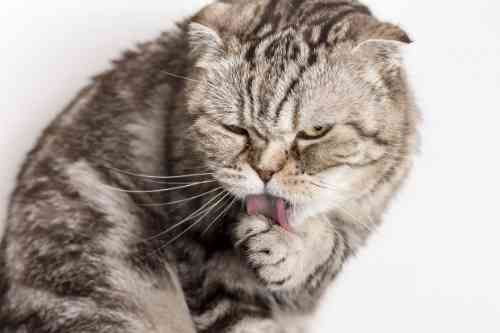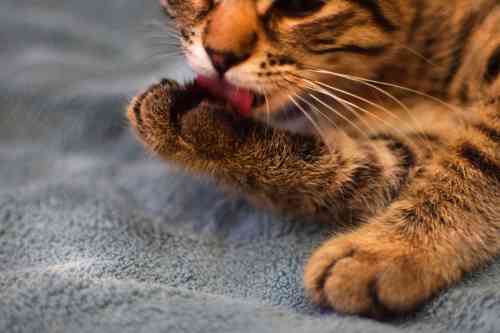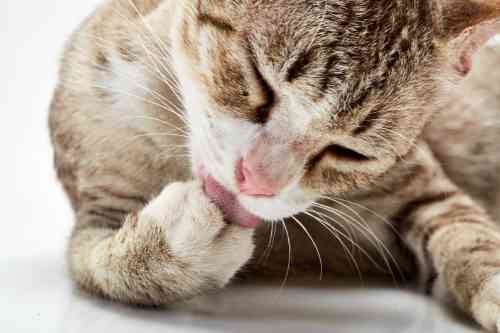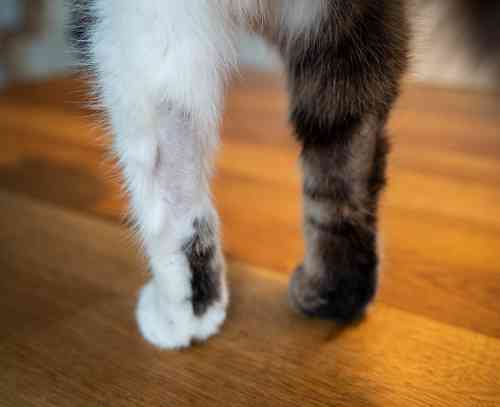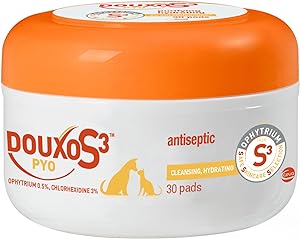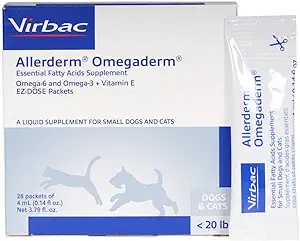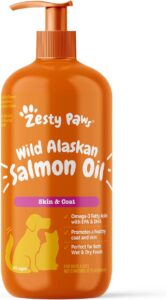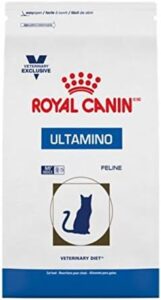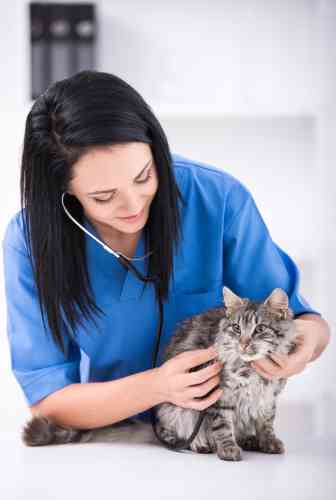Your cat has itchy paws
How to treat it yourself
When your cat has itchy paws, it’s not just annoying for your furry friend, but it can also be quite irritating for you as the owner. That constant licking and gnawing at its itcht paw can drive anyone crazy! Fortunately, in this article, we offer various solutions to treat the itchiness of your cat’s paws. We discuss how the itchiness occurs, what symptoms you can observe, and what you can do about it yourself. So read on quickly to find out the best ways to relieve that itch!
How does the itch in your cat’s paws arise?
The nerves in your cat’s skin can get irritated due to certain causes. These nerves then send a signal from the skin to the spinal cord. Another nerve picks up the signal there and passes it on to your cat’s brain. Special areas in the brain process these itch signals, making your cat aware that something is not right with its paw, and is causing itchiness. This annoyance prompts a reaction to get rid of the itch, such as licking or biting the spot.
What causes your cat to have itchy paws?
Several possibilities can lead to the fact that your cat has itchy paws. The most common causes are:
- An allergic reaction
- Inflammation
- Drying moisture
- An insect sting like a wasp or bee
But itching on your cat’s paw can also occur if there are fleas, a flea allergy, mites, fungus or problems with its thyroid. However, they rarely only cause itching on the paws. In general, you will see symptoms on several body parts or more damage to the skin.
Allergic reaction as a cause of itchy paws in your cat
If an allergic reaction is the cause of the itch on your cat’s paw, it is usually due to a food allergy. However, another common type of allergy is an atopy. With a food allergy, the allergic reaction is triggered by an ingredient in the food (or treats) your cat eats. This then leads to inflammatory reactions in your cat’s skin, causing the itchiness. In severe cases, clear wounds can also develop, but this is not always the case. And most often, this type of allergy causes itching primarily on the paws or head.
Atopy refers to an allergic reaction to substances your cat inhales. For example, tree pollen, grass pollen, dust mites, etc. In this case too, inflammation in the skin occurs, leading to itchiness and, in severe cases, to skin wounds. This reaction is mostly seen on a cat’s head, but the paws are often affected as well.
Skin inflammations on your cat’s paw causing the itch
In fact, this same principle applies to allergies. However, skin inflammation can also arise if the skin remains very moist, allowing bacteria to infect the skin. This can cause itchiness in your cat’s skin, especially on its paws. As a result of the bacteria, skin damage can occur. This releases a lot of substances that signal to your cat’s immune system that there is damage. Many mechanisms are then activated to repair this damage. But in the meantime, your cat has itchy paws.
Drying moisture as a cause of an itch on your cat’s paw
If your cat has been outside in a damp environment, it comes back in with wet paws. The drying of these paws causes a tickle that stimulates your cat’s nerves. In such cases, your cat will excessively lick its footpads for about an hour after coming inside. After that, you generally won’t notice anymore that your cat has itchy paws.
A variant of this drying moisture occurs when it has snowed or when it’s freezing outside. The snow sticks even better to your cat’s paws and thus takes longer to dry. Although they usually clean it off well. However, cats rarely play in the snow, so this doesn’t happen often. If there has also been salt spread outside to avoid slippery roads, your cat may suffer from dried-out paw pads where cracks can form. These too can become slightly itchy and irritating. This itch is then only on the underside of their paws.
Insect stings can also cause an itch on your cat’s paw
Quite regularly, a cat decides to play with that flying creature it encounters outside. Therefore, it’s not uncommon for a cat to be stung by, for example, a wasp or a bee. This can result in an itchy bump, causing you to notice that your cat continuously licks that particular spot.
Symptoms of an itch in your cat’s paws
There are a few symptoms you may notice when your cat has itchy paws:
- Excessive licking of the itchy paw
- Biting or gnawing at the itchy paw
- Red skin
- Bald spots
- Skin damage (possibly from excessive licking)
- Paw swelling
- Behavioral changes due to sleep deprivation from itchiness
Home remedies to treat itchness
Treating inflammation:
If your cat just got itchy paws, we shouldn’t immediately assume it’s an allergy. It’s more likely that there’s been a skin injury that is now healing, causing itchiness on your cat’s paw. Thoroughly examine the area your cat is licking. If you see redness, small skin lesions, or mild swelling, it indicates skin inflammation. In this case, you should treat your cat with an itch-relieving and anti-inflammatory ointment. The best option for this is Douxo S3 Pyo. Apply it twice daily for 5-7 days on your cat’s itchy paw. After this period, the itching should be gone.
Improve skin resistance
In many cases, itchiness is caused by the skin not functioning optimally. Even with mild allergies, it can be sufficient to only increase the skin’s resistance. Therefore, it’s wise to improve your cat’s skin resistance using omega-3 fatty acids. These fatty acids enhance the skin barrier, strengthen the fur, and counteract inflammation. All this will ensure that the skin is less prone to itching. You can give your cat omega-3 fatty acids by adding Allerderm to its food. Alternatively, you can use salmon oil, which is somewhat cheaper. However, the quality of many salmon oil products is not optimal. The brand below is a suitable choice.
Foodallergie-test
If your cat has been suffering from itchy paws for a long time, there’s a possibility that it could be due to an allergy. The only test you can perform yourself is a food allergy test. By feeding your cat Royal Canin Ultamino and absolutely nothing else besides that, your cat won’t have an allergic reaction if it suffers from a food allergy.
The ingredients in this food are processed to make them very small, so your cat’s immune system can’t react allergically to them. However, it takes about 4 weeks for all the old nutrients to leave your cat’s body. Therefore, it can take up to 4 weeks before you see any results. You need to continue the test for 8 weeks, with results typically becoming apparent in the last 4 weeks. If there’s no change after 8 weeks, then it’s likely not a food allergy.
When to visit your vet if your cat has an itch on it’s paw?
If the itchiness on your cat’s paw is quite intense, it’s wise not to wait too long before visiting your veterinarian. They can prescribe quite strong ointments which can significantly reduce the itch and any potential inflammation. This way, your cat can get rid of its itchiness the fastest.
If your cat starts to become moody or if actual wounds begin to form, you shouldn’t wait too long either.
When your cat isn’t too disturbed by its itchiness, you can try the above advice. If none of them work, there’s a good chance your cat has atopic allergies. Your veterinarian can perform a blood test to confirm this.
Good luck!
We hope these home remedies alleviate your cat’s paw itchiness. After all, your cat deserves a life free of itchiness. Good luck with the treatments!

